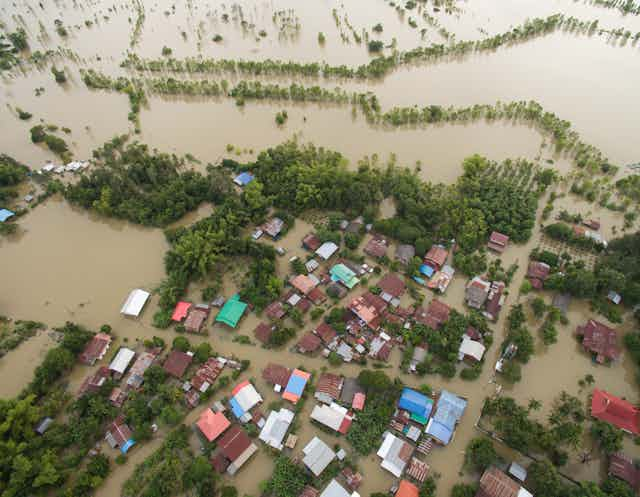Scientists on the Intergovernmental Panel on Climate Change (IPCC) just published a stark new warning about the impacts climate change is already having on our planet. Some of these impacts are already irreversible. In this episode of The Conversation Weekly, we talk to three of the scientists involved in the report about what the future may hold – and the narrowing window of opportunity to adapt to climate change.
And a section of a rocket is about to crash on the Moon. A planetary scientist tells us what he’s hoping to learn from studying the collision and the crater it will leave behind.
In the first part of its latest assessment published in August 2021, the IPCC confirmed Earth has already warmed by 1.09°C since pre-industrial times as a result of human activity. Now, in this second report, scientists project a future of droughts, floods and sea-level rise that could lead to mass extinctions and have dramatic effects on people’s health and livelihoods.
The IPCC warns that children aged ten or younger in 2020 are projected to experience a nearly fourfold increase in extreme events under the 1.5°C of global warming scenario, but that could increase to a fivefold increase under 3°C of warming.
“It’ll be a world where danger is more present than it is currently,” says Mike Howden, director of the Institute for Climate, Energy and Disaster Solutions at the Australian National University in Canberra, Australia and a vice-chair of the IPCC. People’s lives will be a lot more disrupted, Howden says, and people “will be much poorer because extreme events cost a lot of money to recover from”.
Around the world, communities have been putting in place strategies to adapt to the effects of climate change. Balsher Singh Sidhu, a postdoctoral research fellow in resources, environment and sustainability at the University of British Columbia in Canada, reviewed over 1,800 case studies that assessed adaptation to climate change around the world for a chapter on water in the IPCC report. He tells us that over 80% of these were related to water – and that most of those were for agriculture. Adaptations included farmers using irrigation, changing their cropping calendar according to water availability and using different crop varieties.
The IPCC projects that if the world warms by 2°C by the end of this century, up to 3 billion people could experience chronic water scarcity due to droughts. Sihdu says that beyond a certain level of global temperature rise, “there’s a point of diminishing returns” for all these adaptation strategies. “We need adaptation, and we need mitigation, right here and right now.”
Edward Carr, a professor of international development, community and environment at Clark University in the US, who co-authored a chapter of the report on climate-resilient development, emphasises the need for transformation in the face of what’s to come. Carr says that while the idea of transformation can sound scary, it’s really about hope. “There are lots of things we can do to address what is coming,” he says, explaining that there are still multiple, transformative options available for different parts of the world. “We still have choices to make,” he says.
In our second story, we hear why scientists are excited to see what happens when a rocket booster crashes into the far side of the Moon on March 4. “This kind of opportunity doesn’t come along every day,” says Paul Hayne, assistant professor of astrophysical and planetary sciences at the University of Colorado Boulder in the US. “It’ll be travelling at about 2.6km per second which is approaching about 6,000 mph,” says Hayne, who will be waiting to see if the impact crater the rocket makes matches scientists’ predictions. (Listen from 36m)
And Jonathan Este, international affairs editor for The Conversation based in Cambridge in the UK, recommends some academic analysis of the Russian invasion of Ukraine. (Listen from 46m30)
This episode of The Conversation Weekly was produced by Mend Mariwany and Gemma Ware, with sound design by Eloise Stevens. Our theme music is by Neeta Sarl. You can find us on Twitter @TC_Audio, on Instagram at theconversationdotcom or via email. You can also sign up to The Conversation’s free daily email here.
Newsclips in this episode are from CNA and the IPCC.
You can listen to The Conversation Weekly via any of the apps listed above, download it directly via our RSS feed, or find out how else to listen here.

